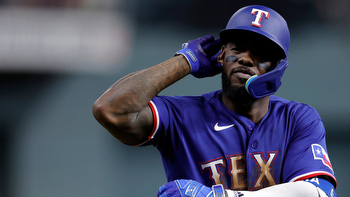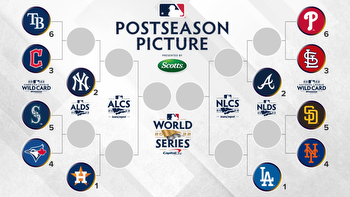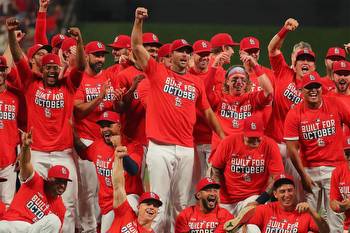MLB playoffs poll: Insiders weigh in on new format, manager’s role, pitcher usage
Rob Biertempfel, Dan Connolly and C.T. Rosecrans are the experts on the new format and manager's role.
The Athletic has compiled a panel of eight experts to discuss the current sports events. They include two active players, three scouts and three coaches.
The new playoff format has affected this year's tournament. The number of teams and first-round byes are also factors. In the regular season, a manager's most important role is to serve as a unifier.
In the MLB playoffs, a team is only as good as its starting rotation. The panelists were granted anonymity so they could be open with their opinions about the game.
Scout No. 1 loves the added intensity of the playoffs. The best-of-three round gives teams the opportunity to gain some momentum. However, the extra downtime can be a disadvantage for position players.
The new playoff format is good for the fans and good on the game. The new format should incentivize more front offices to be competitive and invest in their major-league rosters.
The current format for the playoffs is not ideal. The top two teams in each league have a four-day layoff. One suggestion is to make the divisional round a best-of-seven.
Player No. 1 is indifferent on the new playoff format. Player No., 2 is a fan of the one-and-done wild-card games.
The extra downtime for the players during the playoffs is helpful for those who won their divisions, but difficult for players who play every day for 162-plus days. The three-game wild-card deal instead of the one- game setup was cool. It gave you a chance to see the whole team instead just one pitcher.
The new format should put the lower seeds at a disadvantage, according to Scout No. 2. It didn't seem to hurt the Astros and the Yankees. In the future, managers who get a first-round bye are going to have to find ways to keep their players sharp.
The new three-game playoff format puts pressure on teams. The margins in the playoffs are razor thin. Coach No. 2 thinks winning a division over 162 is a big feat. He thinks the new format is good. It's good because it keeps everyone on edge. They don't want foregone conclusions in playoffs. Teams and front offices put a lot of effort into being good and trying to win the margins.
This year's playoffs have been unpredictable. The key to success is hot starting pitching, reliable bullpen and the ability to hit home runs. Scout No. 3 is not a big believer in "just get in and let the chips fall where they may."
Scout No. 1 thinks the influence of modern-day baseball operations has diminished the manager's in-game decisional impact. Managers that keep their players and clubhouses as comfortable and consistent as during the regular season is the greatest area of postseason influence.
Scout No. 2 thinks analytics have changed the manager's job more than the playoffs themselves. One manager was handed a sheet by the front office and told how to manage the game.
The pressure of the playoffs affects the players and managers. The managers that operate in the "gray area" the best will perform the most in this environment. They will communicate the least with their players. They should stay relaxed and loose. In the postseason, they should trust their player and staff in a similar way as they did in regular season.
Player No. 1 thinks the manager is the most important player in the playoffs. He explains that the players are the leaders of the team and the managers are responsible for their performance.
Some managers treat regular-season games like they're playoff games. In a shorter series, a starter might be taken out earlier. Jameson Taillon was taken off after 4 1/3 innings in the American League Championship Series.
Scout No. 3 thinks the playoffs are different than the regular season. He thinks managers need to be more on their toes and willing to check egos. He also thinks you can't play the macho man game in the postseason. The scout thinks that managers have to stay ahead and prepared for things.
Coach No. 3 believes the difference between the playoffs and the regular season is overstated. He believes that in the postseason, players are more focused on winning the game than in regular-season games. He also believes there's a sense of urgency in playoffs. It's about capitalizing on the momentum and putting down the opportunity. The team needs to score right now. In the fifth or sixth inning, the team's focus changes.
Starting pitching always matters in the playoffs. The variance brought into a game when relievers have to cover too many innings because of a poor start makes him uncomfortable.
In the playoffs, teams don't trust the whole bullpen in leverage moments. Having enough starting pitching to minimize exposure for the bullpen is very important. In 2016, Andrew Miller, Cody Allen and Bryan Shaw carried Cleveland to a 3-1 lead in the World Series against the Cubs.
Player No. 1 thinks the playoffs are the toughest because the dynamic is constantly changing. The game is unpredictable and players have to be ready at any point in time.
Good starting pitching is the key to winning games. If you only have starters that go for five or six innings, it's difficult to maintain over three playoff series.
Scout No. 2 believes starting pitching is important in a seven-game series. Scout No., 1 thinks it's hard to bring someone back on three days' rest in the playoffs.
Player No. 2 says you need three or four starters in the playoffs. Teams that get to the World Series have four horses in rotation and a good bullpen.
The teams that win are those that have good starting pitching. The bullpen management is important. It's risky to run bullpen guys out in all three games.
Coach No. 3 thinks that in a seven-game series, it's too taxing to put too much on the bullpen. He prefers to use a horse that can get through the lineup multiple times.



































